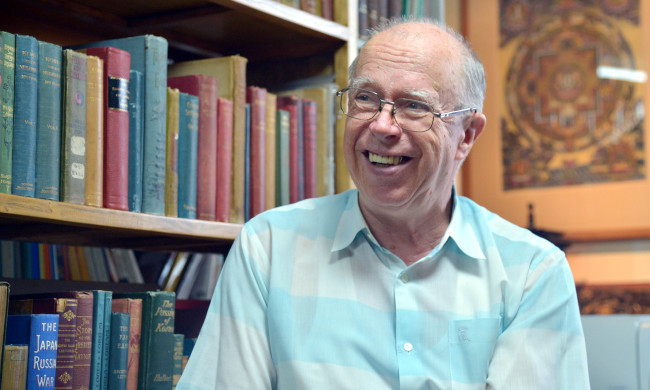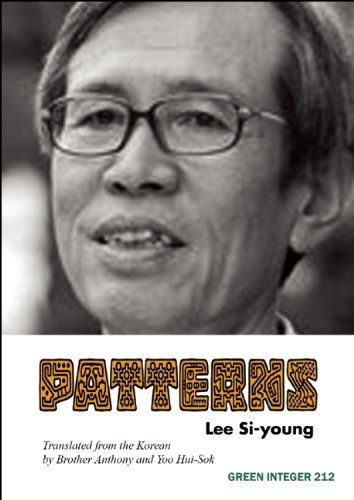Brother Anthony of Taize, a translator of Korean literature and emeritus professor of English at Sogang University, recently translated two poem anthologies: “Shadows of the Void” and “Patterns.”
As one of the first non-Korean translators, Brother Anthony has published around 30 books of Korean poetry and works of fiction into English over more than 20 years, including noteworthy works by Ku Sang, Ko Un and Yi Mun-yol.
As one of the first non-Korean translators, Brother Anthony has published around 30 books of Korean poetry and works of fiction into English over more than 20 years, including noteworthy works by Ku Sang, Ko Un and Yi Mun-yol.

Also known by his Korean name An Son-jae, the 72-year-old first came to Korea in 1980 at the invitation of Cardinal Kim Sou-hwan. He had met the late cardinal while working in a slum in Davao, the Philippines, for three years, with the Taize community, a French-based Christian ecumenical movement.
From Cornwall, England, he taught French and English literature at Sogang University and became a naturalized Korean citizen in 1994.
‘Shadows of the Void’
“Shadows of the Void” is a collection of poems written by Park Ynhui, a philosopher and writer who goes by the pen name Park Yee-mun in Korea.
Brother Anthony describes the works as simple and suggestive, inviting readers to find a connection with some moments and some scenes.
“Park Ynhui is a poet inhabited by a compassion born of the suffering he witnessed and experienced in childhood and youth,” writes the brother in the foreword. “His poems reenact a search for consolation and peace, faced with the meaninglessness and absurdity of human existence.”
The book introduces 86 poems chosen from five volumes of Park’s poetry. They include “Snow on the Charles River” (1979), “Dream of a Butterfly” (1981), “Shadows of Things Unseen” (1987), “Echoes of the Void” (1989), “Morning Stroll” (2006) and “The Fury of Elephants Raised as Orphans” (2010).
Park was born in Korea in 1930 during the Japanese colonial period. He spent his adolescent years at the height of the Pacific War (1941-45) and then experienced the Korean War (1950-53). Living the turbulent period, he was swayed by the nihilism that dominated the literary scene of the time. But due to his education at the Sorbonne in Paris, from which he received a Ph.D. in philosophy, and at University of Southern California in U.S. for his second doctorate in philosophy, Park was able to conclude his own definition of nihilism ― that there is no absolute answer in anything. His 2005 book, “The Passion of a Happy Nihilist” chronicles his searches and endeavors to find the meaning of life as a passionate nihilist.
“Shadows of the Void” can be purchased at the publisher’s website, www.seoulselection.com.
‘Patterns’
“Patterns” is Korean poet Lee Si-young’s first single-volume, full-length poetry book translated into English by Brother Anthony and Yoo Hui-sok, a professor of the department of English language education at Chonnam National University.
The anthology consists of 125 poems selected from his 10 published books, with six poems from the 65-year-old poet’s first published volume “Manweol” (Full Moon) in 1976 starting the book.

Living through Korea’s tumultuous modern history, Lee wrote many easy-to-read, accessible poems depicting people who had to survive in the shadow of the Park Chung-hee military dictatorship in the 1970s and 1980s. During this time, Lee was imprisoned several times for openly discussing freedom, democracy and oppression and participating in a democratization movement with other politically active writers. He served as vice president of Changbi Publishers, Inc. for many years and is in charge of the International Creative Writing Center at Dankook University.
Lee’s poetry embodies his experiences of historic moments, according to Yoo. “He records the traumatic traces, the indelible scars of the collective life of the Korean people in the 20th century with a personal touch.”
“Patterns” can be purchased online at www.amazon.com.
By Ahn Sung-mi (sahn@heraldcorp.com)
-
Articles by Korea Herald






![[From the Scene] Monks, Buddhists hail return of remains of Buddhas](http://res.heraldm.com/phpwas/restmb_idxmake.php?idx=644&simg=/content/image/2024/04/19/20240419050617_0.jpg&u=20240419175937)









![[From the Scene] Monks, Buddhists hail return of remains of Buddhas](http://res.heraldm.com/phpwas/restmb_idxmake.php?idx=652&simg=/content/image/2024/04/19/20240419050617_0.jpg&u=20240419175937)

![[KH Explains] Hyundai's full hybrid edge to pay off amid slow transition to pure EVs](http://res.heraldm.com/phpwas/restmb_idxmake.php?idx=652&simg=/content/image/2024/04/18/20240418050645_0.jpg&u=20240419100350)

![[Today’s K-pop] Illit drops debut single remix](http://res.heraldm.com/phpwas/restmb_idxmake.php?idx=642&simg=/content/image/2024/04/19/20240419050612_0.jpg&u=)